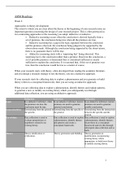Samenvatting
Summary of the readings for Advanced Research Methods
- Instelling
- Erasmus Universiteit Rotterdam (EUR)
Summary of the readings for Advanced Research Methods of the bachelor Business Administration / Bedrijfskunde at the RSM, Erasmus University.
[Meer zien]







